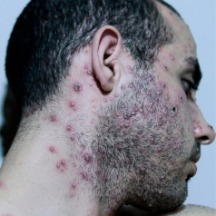An outbreak of a disease called monkeypox is currently taking place in Europe and North America where cases have been rare. Typically, the disease is found in portions of central and west Africa where health authorities are reporting a higher number of cases this year over the last.
The Euro-American outbreak has prompted The World Health Organization (WHO) to convene a special meeting to discuss monkeypox research priorities and related issues today reports the Associated Press. Looking ahead, Oyewale Tomori, a Nigerian virologist who sits on several WHO advisory boards, said releasing smallpox vaccines from the agency’s stockpile to stop monkeypox from becoming endemic in richer countries might be warranted, but he noted a discrepancy in WHO’s strategy.
“A similar approach should have been adopted a long time ago to deal with the situation in Africa,” he said. “This is another example of where some countries are more equal than others.”
As we learned with HIV and with COVID, misinformation spreads infection amongst groups that believe they are not at risk, leads to dangerous silencing and shaming, and harms public health.
The discrepancies in response are very visible. In the United States, government officials have released about 700 doses of vaccine to states where cases were reported. Doses from the U.N. health agency’s stockpile have never been released for any monkeypox outbreaks in central or western Africa.
Monkeypox Virus Disparities: Here We Go Again
Health


Almost echoing the HIV crisis, a notable proportion of recent cases in the United Kingdom and Europe have been found in gay and bisexual men. There have been more than 1,400 monkeypox cases and 63 deaths in four countries where the disease is endemic — Cameroon, Central African Republic, Congo and Nigeria — according to the Africa Centers for Disease Control and Prevention.
And, health officials have warned people to learn from the HIV and COVID epidemics. DaShawn Usher, of the LGBTQ+ advocacy organization GLAAD, told Newsweek, "Health reporting should always lead with facts and science, and not single out groups of people based on who they are. As we learned with HIV and with COVID, misinformation spreads infection amongst groups that believe they are not at risk, leads to dangerous silencing and shaming, and harms public health."
Routine vaccination of the American public against smallpox stopped in 1972 after the disease was eradicated in the United States. In 1980, the disease was declared eradicated following worldwide vaccination programs. However, the New York State Department of Health reports the U. S. government is taking precautions to be ready to deal with a bioterrorist attack using smallpox as a weapon.
Monkeypox is in the same family of viruses as smallpox, and smallpox vaccines are estimated to be about 85% effective against monkeypox, according to WHO. The CDC reports that in humans the symptoms of monkeypox are similar to but milder than the symptoms of smallpox. Monkeypox begins with fever, headache, muscle aches, and exhaustion. The main difference between symptoms of smallpox and monkeypox is that monkeypox causes lymph nodes to swell (lymphadenopathy) while smallpox does not. The incubation period (time from infection to symptoms) for monkeypox is usually 7−14 days but can range from 5−21 days.
And, health officials have warned people to learn from the HIV and COVID epidemics. DaShawn Usher, of the LGBTQ+ advocacy organization GLAAD, told Newsweek, "Health reporting should always lead with facts and science, and not single out groups of people based on who they are. As we learned with HIV and with COVID, misinformation spreads infection amongst groups that believe they are not at risk, leads to dangerous silencing and shaming, and harms public health."
Routine vaccination of the American public against smallpox stopped in 1972 after the disease was eradicated in the United States. In 1980, the disease was declared eradicated following worldwide vaccination programs. However, the New York State Department of Health reports the U. S. government is taking precautions to be ready to deal with a bioterrorist attack using smallpox as a weapon.
Monkeypox is in the same family of viruses as smallpox, and smallpox vaccines are estimated to be about 85% effective against monkeypox, according to WHO. The CDC reports that in humans the symptoms of monkeypox are similar to but milder than the symptoms of smallpox. Monkeypox begins with fever, headache, muscle aches, and exhaustion. The main difference between symptoms of smallpox and monkeypox is that monkeypox causes lymph nodes to swell (lymphadenopathy) while smallpox does not. The incubation period (time from infection to symptoms) for monkeypox is usually 7−14 days but can range from 5−21 days.
Advertisers | Contact Us | Events | Links | Media Kit | Our Company | Payments Pier
Press Room | Print Cover Stories Archives | Electronic Issues and Talk Radio Archives | Writer's Guidelines






